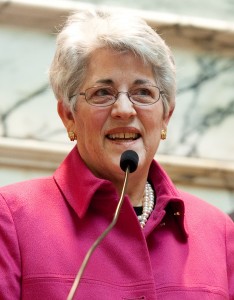Md. treasurer, auditors continue wrangling over how to handle worker compensation insurance
Auditors have found continuing problems with how the Maryland State Treasurer’s Office handles workers compensation insurance payments and claims for state employees amounting to $268 million over the past three years.
The legislative auditors said the treasurer’s office didn’t verify payments to the Injured Workers Insurance Fund or assure the contract for IWIF’s services is consistent with services actually performed. The office also did not try to reduce workers comp losses by assessing the claims data or get those data to the agencies ultimately incurring the claim expenses, so they could cut claims losses.
The Office of Legislative Audits (OLA) reported these longstanding findings in its latest audit of the State Treasurer’s Office (STO). They also found other problems with transfers of interest earnings, and modernizing two cash-disbursements internal controls.
IWIF, which was set up by the legislature, is now independent Chesapeake Employers Insurance Co. under a law passed in 2012, but IWIF continues to exist to process workers compensation claims for state employees.
Treasurer says its up to the legislature
In her response, State Treasurer Nancy Kopp said, “This is basically a public policy issue and further, that the policy decision is one for the General Assembly, first, and the Board of Public Works, second, to make. It is not a policy decision to be made by the Office, which simply serves as the administrator for the State’s contract with IWIF. This issue includes the determination whether the claims processing services currently being performed by IWIF should be competitively bid.”
The auditors also reported that the treasurer made substantial progress by resolving nine of 12 findings from its prior audits.
Treasurer passively manages IWIF contract
The treasuer’s manages a major contract between the Board of Public Works (BPW) and the Injured Workers Insurance Fund for third-party administration of the self-insured workers’ compensation program for state employees. This amounted to $268 million over the last three years.
The treasurer has not implemented several longstanding recommendations made by legislative auditors since 2007 and the Maryland Insurance Administration in January 2011, to safeguard the state’s interest in the IWIF. These recommendations include:
- Modify the IWIF contract to identify services IWIF provides and the terms of each service.
- Specify which reporting requirements need to be performed by IWIF so the treasurer can evaluate causes, frequency, and severity of losses.
- Facilitate access by state agencies to claims information so the agencies can attempt to minimize losses.
- Ensure the amounts charged for administrative fees, claims, and claims-related charges are supported and properly chargeable to the state.
Kopp, who has been state treasurer since 2002, takes the position that her office is simply doing what the legislature has told it to do and staffing resources limit its internal control capacity to administrative functions.
The treasurer’s office merely pays IWIF’s invoices, and collects pro-rata workers-comp expenses from the respective state agencies.
However, in response to the audit and after seeking clarification from the legislature, Kopp agreed to begin working with the Board of Public Works, on which she serves, “to obtain the necessary staff that will be required to negotiate a new contract incorporating a new payment structure and other contract requirements in the best interests of the state.”
Timely transfer of earned interest
STO doesn’t regularly ensure that interest earned on state funds deposited in agency bank accounts is transferred to the General Fund. Further, STO did not maintain a record of the disparate bank accounts for which earned interest was required to be transferred to the State, nor had STO established a methodology to determine that interest was being transferred to the State.
The auditor found that, during fiscal year 2012, STO became aware of approximately $2 million in accumulated interest earned on State working funds held in a separate interest-bearing bank account that had not been transferred to the General Fund. The interest earned accumulated from December 2005 to December 2011.
OLA reported that similar conditions involving smaller amounts have been reported in its seven preceding audit reports dating back to September 1993.
In response to the audit, the treasurer’s office maintained that responsibility for transferring interest in state accounts is jointly held by agencies and the STO. Kopp’s office blamed the lack of direct oversight of each interest transfer on the very large number of accounts and limited staff.
Cash-disbursement control enhancements
As of the date OLA finished its audit fieldwork, STO had not implemented two automated processes to modernize its cash disbursement controls This led to:
- Inaccurate estimates of daily cash needs resulting in 231,282 nonsufficient funds items paid by the bank during the 18 months ended June 2013;
- Failure to assure that commercial banks electronically match payee names on state records against payee names on checks at the time they are presented to such banks for payment.
The treasurer’s office responded that it implemented corrective actions for daily cash estimating on July 1 and for enhanced computer matching on May 1.

MarylandReporter.com is a daily news website produced by journalists committed to making state government as open, transparent, accountable and responsive as possible – in deed, not just in promise. We believe the people who pay for this government are entitled to have their money spent in an efficient and effective way, and that they are entitled to keep as much of their hard-earned dollars as they possibly can.

